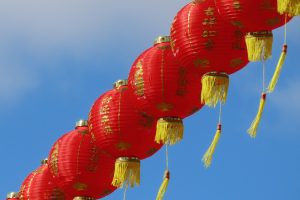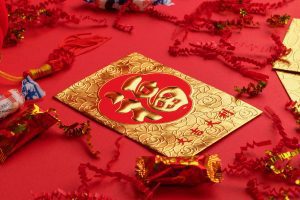 Can you believe we are a month into 2022? Perhaps this new year did not start as you expected, or your resolutions are falling to the wayside. Perhaps you want to reset the clock and start over. Well, you can! February 1, 2022 marks the first day of the Lunar new year. This is a holiday rich in history, tradition, and folklore; and it’s another opportunity to celebrate.
Can you believe we are a month into 2022? Perhaps this new year did not start as you expected, or your resolutions are falling to the wayside. Perhaps you want to reset the clock and start over. Well, you can! February 1, 2022 marks the first day of the Lunar new year. This is a holiday rich in history, tradition, and folklore; and it’s another opportunity to celebrate.
Here are some fun facts and superstitions about this important holiday!
1. What is Lunar New Year?
Lunar New Year begins with the first new moon of the lunar calendar, and the year ends after 12 full cycles of the moon. It is slightly shorter in length (354 days) than the solar calendar. To make up for the 11 day difference between the solar and lunar years, an extra month is added in the lunar calendar every 3 years (think of it like the leap day we have every 4 years).
While the solar calendar has been adopted for common use, lunar calendars are still used throughout the world to determine religious and national holidays. The Lunar New Year is traditionally celebrated in East Asian countries such as China, Japan, Mongolia, Thailand, Korea, Vietnam, Singapore, and many others. While traditions vary from country to country, the first priority is always family.
2. Why is it important?
The history of Lunar New Year’s Eve can be traced back thousands of years and is the most important holiday in some areas—think Thanksgiving, Christmas, and Easter combined! It is also a public holiday in the Asian countries that celebrate it, so people get several days off from work to be with their immediate and extended families. Family members are expected to come home for New Year’s Eve to share the most important meal of the year.
The celebration lasts for 15 days, starting from Lunar New Year’s Eve to the Lantern Festival. This year, the celebration will date from January 31, 2022 to February 15, 2022. However, families will start to clean their houses weeks ahead of time to get rid of any “bad luck” before the celebrations start.
3. How do you celebrate?
Symbolism is important in Asian cultures, so decorations and food for the holiday are all purposeful. They symbolize luck, prosperity, and good vibes. Red lanterns are hung on trees, streets, in buildings, and on doors to drive off bad luck. Good wishes are written in calligraphy on red paper and are pasted on door frames. Red paper is cut into delicate designs and pasted on doors and windows, and upside down “fu” characters adorn homes. “Fu” means “good fortune” and hanging it upside down indicates the pouring of good fortune. Additionally, kumquats or oranges with leaves are placed in bowls around the house for—you guessed it—good luck.
Cities will have parades, street performances, music, dancing, and fireworks. Families gather to visit, make food, and feast. Often a place is set for those family members who could not return home. Traditional food includes a whole fish (to symbolize abundance), dumplings (for wealth), sweet rice balls (for family togetherness), niangao or rice cakes (for prosperity), noodles (for longevity), vegetables (lots of meanings for various types of vegetables, but in general they’re for health and wealth), and hot pot (think a fondue pot).
In addition to gifts, red envelopes are given out. These red envelopes contain money (make sure the cash is new and crisp) and are traditionally gifted from an elder or parent to a child after the child gives their best wishes. Now, they are also given to friends and employees.
4. Zodiac signs
There are 12 zodiacs, one for each year. 2022 is the year of the tiger, so if you were born in 2022, 2010, 1998, 1986, 1974, 1962, 1950, or 1938, this is your zodiac year. People born in the year of the tiger are said to be strong, brave, competitive and passionate. If you were born in the year of the tiger, you are in good company with Marilyn Monroe, Tom Cruise, Lady Gaga, and Shawn Mendes.
5. Superstitions: what to do and not to do
We have all heard the superstitions to not open an umbrella indoors or stand under a ladder, but did you know there are specific superstitions around the Lunar New Year? For example:
- Do NOT wear black, blue or white; instead, wear red, yellow and gold to bring prosperity
- Do NOT wash your hair or clothes on new year’s day because it symbolizes washing away good fortune.
- Avoid using scissors or getting a haircut on new year’s day.
- Keep things in pairs and do not give away an odd number of gifts or money.
Whatever you do, or don’t do, the important thing is to spend this holiday with family. My family will be elbow deep in dumpling dough and enjoying the occasional shots of Maotai liquor. Happy New Year, everyone!
 Can you believe we are a month into 2022? Perhaps this new year did not start as you expected, or your resolutions are falling to the wayside. Perhaps you want to reset the clock and start over. Well, you can! February 1, 2022 marks the first day of the Lunar new year. This is a holiday rich in history, tradition, and folklore; and it’s another opportunity to celebrate.
Can you believe we are a month into 2022? Perhaps this new year did not start as you expected, or your resolutions are falling to the wayside. Perhaps you want to reset the clock and start over. Well, you can! February 1, 2022 marks the first day of the Lunar new year. This is a holiday rich in history, tradition, and folklore; and it’s another opportunity to celebrate.












